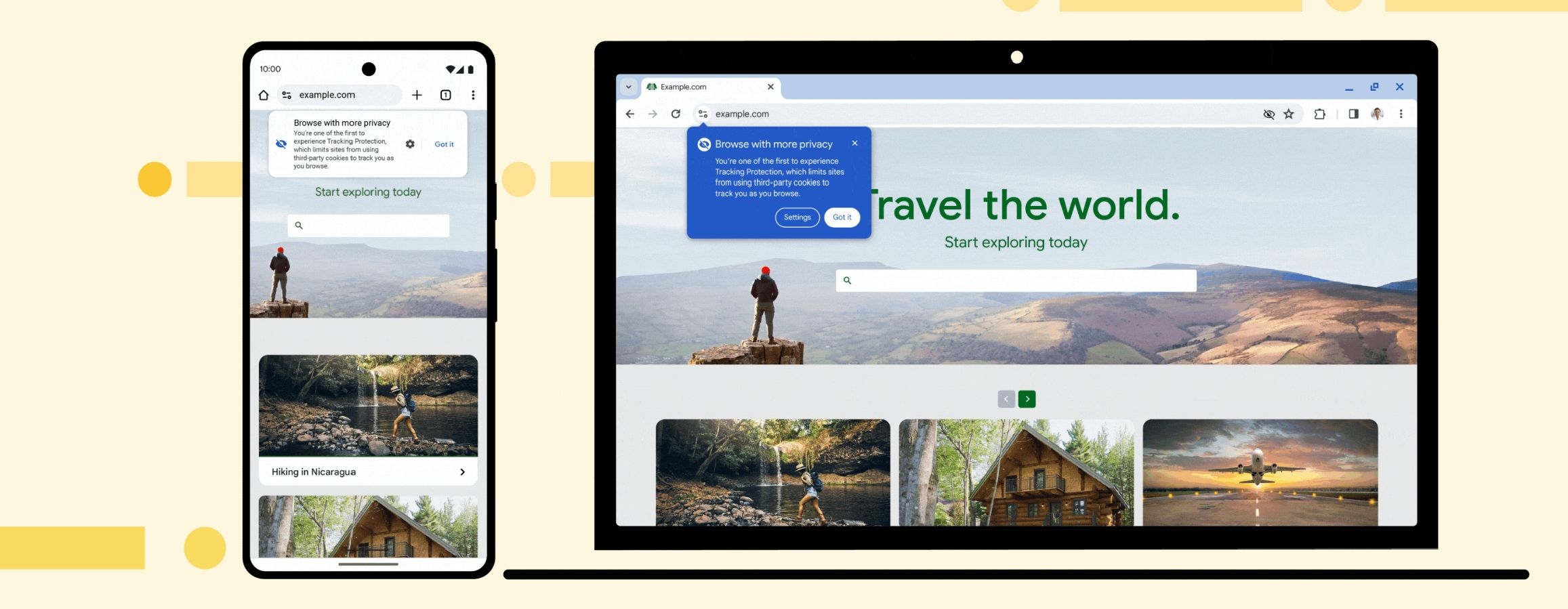
Key Takeaways
- Google is phasing out third-party cookies to give users more control over their online advertising profiles and to protect their privacy.
- The Google Privacy Sandbox replaces third-party cookies with a model that allows targeted advertising while maintaining better privacy.
- Removing third-party cookies may lead to changes in targeted advertising, data collection, and disjointed browsing experiences.
The end of third-party cookies, as we know them, has finally arrived. At least, it has for Google Chrome users, as other browsers like Firefox and Safari have already made the switch and block third-party cookies by default.
But as the world's most popular browser, Google Chrome finally ditching third-party cookies will significantly affect the overall browsing experience, as most websites scramble to comply with the new cookie rules.
Why Google Is Phasing Out Third-Party Cookies
Ever wondered how websites and adverts track you around the internet? You can thank third-party cookies, the small files that enable data collection and tracking across websites, social media, and anywhere else you might venture online. Over time, third-party cookies can build an impressive (or disturbing!) picture of you as a person: health, interests, job, family, and so on.
Understandably, many folks don't want this information to be so easily discernible and readily available to marketers, social media companies, etc.
According to Google's The Keyword blog, starting on January 4, 2024, Google will begin phasing out third-party cookies to allow users better control of their online profile using Google's Privacy Sandbox, allowing individuals to manage their interests and restrict certain topics and content from appearing. The first feature, Tracking Protection, stops cross-site tracking by restricting website third-party cookie access. It's a seismic shift for the advertising industry after many years of discussion and could affect the browsing habits of most people.
However, third-party cookies aren't disappearing for every Chrome user immediately. As per the Google Developers portal, "Chrome plans to disable third-party cookies for 1% of users from January 4, 2024, to facilitate testing." The initial phase is to gauge and test how the new system works, and just one percent of Chrome's more than three billion users is still significant.
What Is Google's Privacy Sandbox?
Google's Privacy Sandbox aims to boost the privacy of internet users while attempting to protect advertisers' income. It's clearly a difficult line to walk, given most of the internet is funded by advertising or tracking. The core function of the Privacy Sandbox is the phase-out of third-party cookies, replacing them with a model based on the FLoC (Federated Learning of Cohorts), designed to allow targeted advertising while delivering better privacy.
- User Browsing Data Stays On-Device: Unlike traditional methods where user data is sent to external servers, FLoC processes the user's browsing history locally, on their own device. This ensures that personal browsing data is not shared with Google or advertisers.
- Creation of Cohorts: FLoC uses algorithms to analyze the browsing history on the user's device and, based on this analysis, groups the user into a "cohort" with thousands of other users. Each cohort consists of users who have shown similar browsing patterns or interests. The cohorts are also dynamic and periodically updated.
- Sharing Cohort IDs, Not Individual Data: Instead of sharing individual browsing data, only the cohort ID—a unique identifier for each group of users with similar interests—is shared with websites and advertisers. This way, advertisers can target ads based on the cohort's overall interests without knowing the individual browsing history of the users in that cohort.
- Privacy Protection: Techniques like differential privacy ensure that cohorts cannot be used to identify individual users, which is crucial for preventing fingerprinting, a common technique used to track users across websites.
Whether the Privacy Sandbox works properly or not is part of why Google is moving just one percent of users to the new process initially. The Google Privacy Sandbox is also available on Android.
How Removing Third-Party Cookies Will Change Your Browsing Experience
There are a few different ways the phase-out of third-party cookies will alter your browsing experience.
One train of thought is that without the ability to closely track users, some advertisers may turn to more underhand or opaque tracking methods to make up the difference. In addition, there will be changes to targeted advertising, perhaps bringing more first-party data collection processes to a wider range of websites.
For example, you might have to create (yet more!) accounts to use a website to keep the data tracking in-house. During the transition phase, there may also be some disjointed experiences; where everything was seamless, the loss of third-party cookies could see websites and services adopt different data collection and advertising approaches, changing how websites are viewed, how services run, and so on.
Advertising revenue is another issue. Although many smaller websites rely on other income streams and typically don't use many third-party cookies, an overall reduction in advertising revenue could see some sites fold.
However, most of these changes are speculation. Firefox and Safari have previously phased out third-party cookies, and websites still work in those browsers, though discounting the effect Chrome's number of users will have on any changes would be shortsighted.
Still, the overall effect of removing third-party cookies should be a more private internet, which can only be a good move for regular folks.
When Will Third-Party Cookie Support End in Google Chrome?
As said, the initial third-party cookie phase-out in Chrome begins on January 4, 2024, but only applies to a tiny fraction of Chrome's total users. If the initial testing phase is successful, Google will flip the switch and move all other users to the system at an undecided date in 2024.


Post a Comment